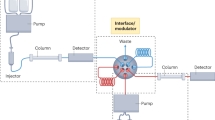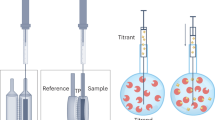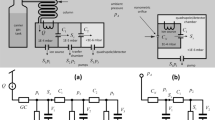Abstract
THE infinite dilution net retention volume (solubility) of solutes in GLC is related to the corresponding partition coefficient K∞ and solvent volume VL via  Although VL usually increases slightly with increasing temperature, K diminishes so rapidly that dVR/dT is inevitably negative. The possibility that means may be found to cause VL to increase with increasing temperature faster than K decreases seems never to have been explored although it obviously presents an approach to practical attainment of a novel GLC situation in which, at least for some range of temperature, d VR/dT is positive or, more interesting, can be made zero.
Although VL usually increases slightly with increasing temperature, K diminishes so rapidly that dVR/dT is inevitably negative. The possibility that means may be found to cause VL to increase with increasing temperature faster than K decreases seems never to have been explored although it obviously presents an approach to practical attainment of a novel GLC situation in which, at least for some range of temperature, d VR/dT is positive or, more interesting, can be made zero.
This is a preview of subscription content, access via your institution
Access options
Subscribe to this journal
Receive 51 print issues and online access
$199.00 per year
only $3.90 per issue
Buy this article
- Purchase on Springer Link
- Instant access to full article PDF
Prices may be subject to local taxes which are calculated during checkout
Similar content being viewed by others
Author information
Authors and Affiliations
Rights and permissions
About this article
Cite this article
MCCREA, P., PURNELL, J. Temperature Independent Retention in Gas Chromatography. Nature 219, 261–262 (1968). https://doi.org/10.1038/219261a0
Received:
Published:
Issue Date:
DOI: https://doi.org/10.1038/219261a0
Comments
By submitting a comment you agree to abide by our Terms and Community Guidelines. If you find something abusive or that does not comply with our terms or guidelines please flag it as inappropriate.



